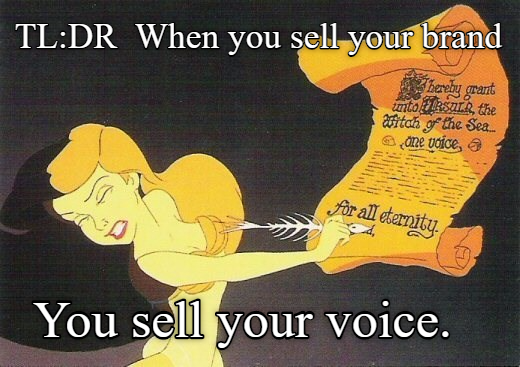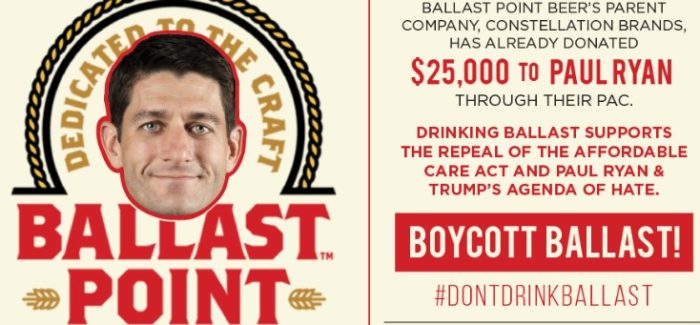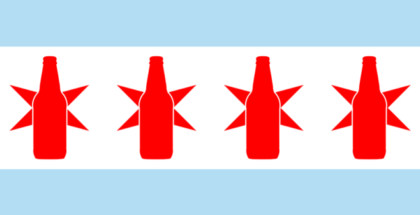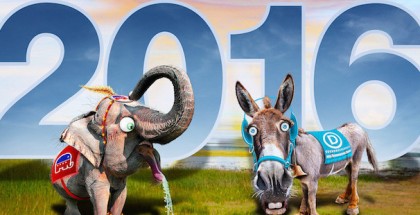Shut Up and Brew: How Do We Deal with Brewery Politics?
On March 10, 2003, Natalie Mains of the Dixie Chicks told a crowd of concert goers in England that she was ashamed that President Bush was from Texas, because of the wars in Iraq and Afghanistan. The backlash was immediate and harsh when the statement was taken out of its anti-war context and presented in the light of ‘we are ashamed of Bush’. It led to a near industry-wide blackout of the Dixie Chicks, who at the time were arguably the biggest country music act to obtain success beyond Nashville since Garth Brooks. As we move along through the first months of the Trump regime, with all the protests and boycotts that have come along with it, it looked like the craft beer world may be dragged into the fray as well.
The Dixie Chicks spoke for themselves, but what happens when a corporation speaks for one of its members? Just ask Ballast Point.
A group called Revolution League, whose stated goal is to stop the conservative movement from gaining traction in the city of Chicago, sent out a cry to boycott Ballast Point because its holding company, Constellation Brands (which also covers Corona, Modela, & Pacifico), has been listed as a sponsor for an upcoming Paul Ryan fundraiser in Chicago with a $50,000 per plate entrance fee. A quick cross check on Constellation’s PAC, the creatively named Constellation Brands Inc., PAC, showed they had previously donated $4,000 directly to Senator Ryan as well as $23,000 to Team Ryan PAC in the last election cycle. Revolution League is calling for Chicago’s citizens and its bars to boycott Ballast until it answers why it is lending support to Speaker Ryan with name recognition and financial support.
Why would Ballast be held to a different standard than any other Constellation beer?
Revolution League does not call for a boycott of any of Constellation’s other major brands, even though they are just as tangibly involved. None of Ballast’s employees are on the board at Constellation. Seemingly, this is actually just another venue in which the eternal struggle of independent craft beer is being singled out as a brand that has “sold out” to a larger corp. Only this time it’s not about control of the brewing process or employees, but control of the brand identity.
It’s no secret that companies are not as politically ideological as individuals. We’re still living in the political landscape post-Citizens United v. F.E.C. You may have heard of it before, and it’s expansion of a fictional personhood onto a corporate political speech. It removed restrictions on corporations and unions for the amount of money they spend on disseminating political speech. This, in turn, created the vast expansion of Political Action Committees and Super-PACS, which were expertly exposed for the absolute scam they are in the long-running series by Stephen Colbert on Colbert Report.
As many journalists love to say, if a company was actually a human, it’d be a sociopath. Companies are largely driven to obtain and maximize profits, and businesses can even be sued by shareholders if they don’t act in the best interest of monetary gain for the corporation. In contrast, when it comes to craft beer politics, breweries that decide to support candidates or support issues that resonate deeply with voters (healthcare, LGBT rights, social services), the decision is usually detached from the company’s best business interest.

Big Beer and Craft Beer Politics: Supporting Candidates
In their roundup of the recent election, the Brewers Association (BA) cheers on wins by both Democrats and Republicans as positives in terms of advancing the modernization of regulations affecting the industry. The BA explained:
“Supporting legislators who support the craft brewing industry is extremely important. Helping to keep legislators in office who actively work to grow your industry is equally important. Your legislative champions are the ones who fight on Capitol Hill for the issues that impact you. “
Politicians on both ends of the political spectrum had sponsored or expressed a support for the Craft Beer Modernization and Tax Relief Act. Many of the donations made from the beverage industry focus more on the major issues facing the company, like removing archaic distribution rules & the reduction of taxes and administrative regulations to help keep costs down and allowing for growth. Brewing rules and regulations, or any type of craft beer politics, are rarely reported by CNN, Fox News, or the New York Times, nor are they the focus for the vast majority of voters.
All you have to do is look at the big boys and you’ll see how this game is played.
InBev’s donation list is staggering, such as in 2016:
- Presidential Campaigns of Hillary Clinton: $13,286
- Chris Christie, Scott Walker, Rick Perry, Carly Fiorino: $2,700 each.
- Donald Trump: $1,349
- Ben Carson: $250
- Gary Johnson: $100
With the crazy Republican primary race, it’s not surprising the company wasn’t positive for whom they should be providing financial support (but even they weren’t willing to donate to “President” Ted Cruz).
InBev’s donations consistently bet on the incumbent staying in place, but the race for Illinois’ 10th District show that they still have to make sure their names on the lips of both candidates. They gave Republican incumbent Mark Kirk $10,400 but made sure that Tammy Duckworth wouldn’t close the door in their faces with a $2,500 donation to her as well. Similarly, Constellation donated $10,000 to Chuck Schumer and $5,000 to both the Democratic National Committee and Duckworth’s PAC.
Senator Ryan has been the poster boy (sometimes quite literally) for the current wave of young conservatism that focuses heavily on the privatization or elimination of social welfare programs like Medicare & Medicaid. It is near impossible to divide support for Paul Ryan from his views on the Affordable Care Act, which is a particularly divisive cause and it appears the thrust of Revolution League’s issue with his support. In these two cases, along with the smaller vocal ones above, the major difference is that the individuals in charge of the actual brewery appear to be the ones who get to make the statement. In their response to the boycott, Ballast Point stated that the brewery doesn’t support Ryan, the healthcare bill, nor do they have any involvement with Constellation PAC’s actions.
Unfortunately, it came couched in a defense of the activities which they have no control over. Ballast is now stuck with an angry fan base for actions that the brewery doesn’t support, with no way to provide real mitigation of the damage to its brand. Meanwhile, Constellation goes forward and has only a small portion of its portfolio possibly affected while its major sellers (Modelo, Corona) get off without a blemish. Time will tell how effective the boycott is and how much of a hit their sales will be affected.
Craft Beer Politics: A Historical Sample
Typically, breweries support causes that either appeal to craft beer drinkers, or are generally regarded as politically inoffensive, which in recent years includes such topics as environmentalism and LGBT rights. Idaho’s Broken Fence Brewing’s “Lil’ Bitch Otter” after then Governor C.L. “Butch” Otter tried to stop a federal judge’s ruling nullifying the state’s same-sex marriage ban, while Scotland’s BrewDog has created beers that supported both transgender and LGBT issues. Oskar Blue’s actions towards providing aid during the Flint Water Crisis received national attention both for its brand and its previous charitable efforts. As noted, another common cause in brewing that appeals to the craft beer involves environmental consciousness, notably sustainable efforts intended to offset any contributions to climate change.
Revolution League can argue precedent:
- Sam Adams pulled out of the St. Patrick’s Day parade because of the Boston Parade’s refusal to allow gay groups. The main issue, though, is that Sam Adams was protested for lending their name to a group and Sam Adams was able to effectively respond on their terms.
- Yuengling’s owner welcomed Eric Trump to a brewery tour and openly told the press he was “our guy”, the backlash was loud enough to reach the national daily press and outlets like Forbes. Brian Sims, a Pennsylvania Democrat whose star has been rising over the years, immediately called upon gay bars to stop stocking the beer.
- Yuengling also faced another boycott by Teamsters and other Union groups after a nasty fight at the National Labor Review Board over whether an address to his workers was a “pep talk” or a threat to disband their union attempts, as reported by the Washington Post.
In those cases, along with the smaller vocal ones above, the major difference is that the individuals in charge of the actual brewery appear to be the ones who get to make the statement. Yuengling, Sam Adams, and hundreds of other brewers can take a gamble on making their own political statements and absorbing the consequences. But for a growing number of breweries who are bought up by larger companies, the loss of independence can allow someone to destroy the brand they spent years growing not by changing recipes or processes, but with words. Ballast Point is learning the hard way what happens when your voice is no longer your own.

-
While i agree that companies should not get involved in issues it’s because I am conservative in outlook and resent the attempts of the left labeling me as racist, sexist, etc. Any time a brewer lends their name to the protest of the week, I don’t drink that brew. Oh, and note, when you reference Stephen Colbert, you lose credibility.
-
Sorry wait I missed the part where you explain why the ACA is remotely good
-
If the article was a defense of the ACA I would have.
Instead, the article is about what happens to a brewery when it is no longer independent and held accountable for the actions and statements of their parent company which they have no accountability for.As for a defense of ACA, I’m a student and healthy Michigan (Medicaid Expansion) recipient who was just attacked by two Pitbulls and was able to get treatment to the puncture wounds to my face and hand as well as medications for pain and to prevent infection at no cost. Super happy about that. Last year I paid $300/month for insurance which only covered 4 visits a year with a co-pay, and it turns out that wasn’t even true because now my former doctor is billing me for the first visit as the Insurance company isn’t covering anything even though it was supposed to be covered (this insurance was not bought through “exchange”).
but ACA has nothing to do with beer, so this isn’t best venue.
-
-
I hope the overall outcome of the boycott is to apply enough market pressure on Ballast Point that they have to reverse their, in my opinion, more-expensive-than-other-beers-for-seemingly-no-reason price structure in order to maintain market share. Now that’s a boycott I can get behind!








Comments